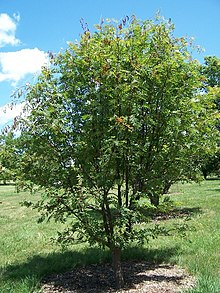Sorbus commixta
| Sorbus commixta | |
|---|---|
 |
|
| Cultivated specimen Morton Arboretum, acc. 28-94-3 |
|
| Scientific classification | |
| Kingdom: | Plantae |
| (unranked): | Angiosperms |
| (unranked): | Eudicots |
| (unranked): | Rosids |
| Order: | Rosales |
| Family: | Rosaceae |
| Genus: | Sorbus |
| Subgenus: | Sorbus |
| Section: | Commixtae |
| Species: | S. commixta |
| Binomial name | |
|
Sorbus commixta Hedl. |
|
Sorbus commixta, the Japanese rowan (七竈 nanakamado?, ナナカマド), is a species of flowering plant in the family Rosaceae, native to Japan, Sakhalin (in the Russian Far East), and the Korean island of Ulleungdo.
The specific epithet commixta means "mixed or mingled together".
Its Japanese name, nana-kamado, literally means "seven (times in the) stove" and alludes to its sturdiness as firewood, as it does not get entirely consumed by the fire of a stove even after repeated use.
It is a small to medium-sized deciduous tree growing to 7–10 m (23–33 ft) tall, rarely 18 m (59 ft), with a rounded crown and brownish to silvery-grey bark. The leaves are 20–30 cm (8–12 in) long, and pinnate. The leaves consisit of 11-17 leaflets, each 4–7 cm (2–3 in) long and 1–2.5 cm broad, with an acuminate apex and serrated margins; they change to a deep purple or red in autumn. The flowers are 6–10 mm in diameter, with five white petals and 20 yellowish-white stamens; they are produced in corymbs 9–15 cm (4–6 in) in diameter in late spring to early summer. The fruit is a bright orange to red pome 7–8 mm in diameter, maturing in autumn.
...
Wikipedia
